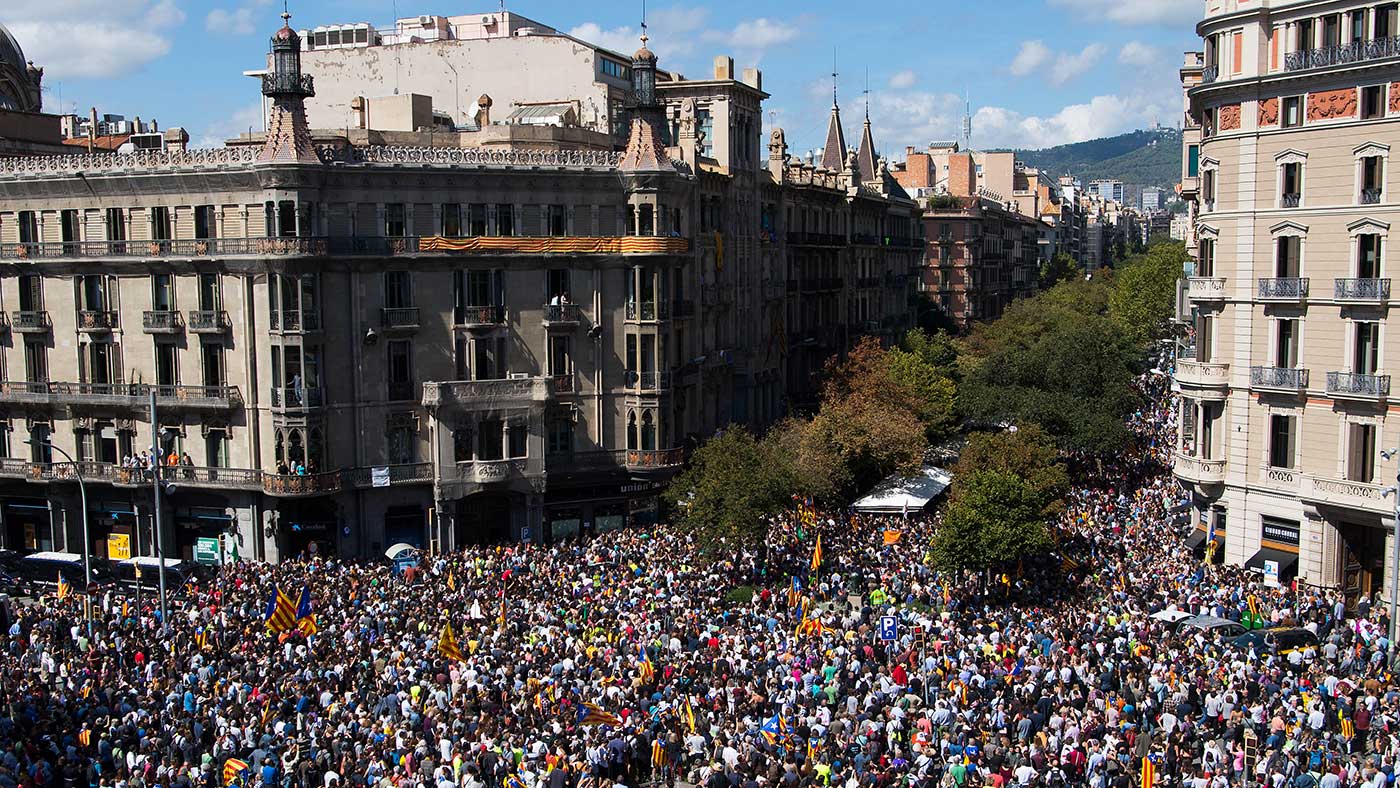Catalonia independence: Spanish PM calls for end to ‘radicalism’
Protests spread following crackdown over Catalonian independence vote

A free daily email with the biggest news stories of the day – and the best features from TheWeek.com
You are now subscribed
Your newsletter sign-up was successful
Spanish Prime Minister Mariano Rajoy has used a televised address to urge Catalan separatists to stop the region’s banned independence referendum from going ahead on 1 October.
“I call on them to end their illegal actions, to abandon their plans, they know this referendum cannot be held,” Rajoy said. “Stop this escalation of radicalism and disobedience once and for all.”
His comments came after thousands of people took to the streets in Barcelona to protest against Madrid’s efforts to halt the referendum, which the Spanish government has deemed illegal.
The Week
Escape your echo chamber. Get the facts behind the news, plus analysis from multiple perspectives.

Sign up for The Week's Free Newsletters
From our morning news briefing to a weekly Good News Newsletter, get the best of The Week delivered directly to your inbox.
From our morning news briefing to a weekly Good News Newsletter, get the best of The Week delivered directly to your inbox.
“Spanish Guardia Civil officers raided a dozen Catalan regional government offices and arrested 14 senior officials on Wednesday as part of an operation to stop the referendum from taking place,” The Guardian says. They included Josep Maria Jove, Catalonia's deputy vice president.
The president, Carles Puigdemont, “accused the central government of effectively suspending devolution after it moved to seize control of regional finances to stop them being used to fund the referendum”, reports the BBC.
“We believe that the Spanish government has crossed the red line that separated it from repressive authoritarian regimes and has become a democratic shame,” he said.
If the referendum does go ahead on 1 October, it remains unlikely that Spain’s largest economic region would back a breakaway.
A free daily email with the biggest news stories of the day – and the best features from TheWeek.com
“Just 35% said Catalonia should be independent in a July survey by the Catalan government’s polling agency,” says Bloomberg.
-
 Political cartoons for February 16
Political cartoons for February 16Cartoons Monday’s political cartoons include President's Day, a valentine from the Epstein files, and more
-
 Regent Hong Kong: a tranquil haven with a prime waterfront spot
Regent Hong Kong: a tranquil haven with a prime waterfront spotThe Week Recommends The trendy hotel recently underwent an extensive two-year revamp
-
 The problem with diagnosing profound autism
The problem with diagnosing profound autismThe Explainer Experts are reconsidering the idea of autism as a spectrum, which could impact diagnoses and policy making for the condition
-
 Epstein files topple law CEO, roil UK government
Epstein files topple law CEO, roil UK governmentSpeed Read Peter Mandelson, Britain’s former ambassador to the US, is caught up in the scandal
-
 Iran and US prepare to meet after skirmishes
Iran and US prepare to meet after skirmishesSpeed Read The incident comes amid heightened tensions in the Middle East
-
 Israel retrieves final hostage’s body from Gaza
Israel retrieves final hostage’s body from GazaSpeed Read The 24-year-old police officer was killed during the initial Hamas attack
-
 China’s Xi targets top general in growing purge
China’s Xi targets top general in growing purgeSpeed Read Zhang Youxia is being investigated over ‘grave violations’ of the law
-
 Panama and Canada are negotiating over a crucial copper mine
Panama and Canada are negotiating over a crucial copper mineIn the Spotlight Panama is set to make a final decision on the mine this summer
-
 Why Greenland’s natural resources are nearly impossible to mine
Why Greenland’s natural resources are nearly impossible to mineThe Explainer The country’s natural landscape makes the task extremely difficult
-
 Iran cuts internet as protests escalate
Iran cuts internet as protests escalateSpeed Reada Government buildings across the country have been set on fire
-
 US nabs ‘shadow’ tanker claimed by Russia
US nabs ‘shadow’ tanker claimed by RussiaSpeed Read The ship was one of two vessels seized by the US military